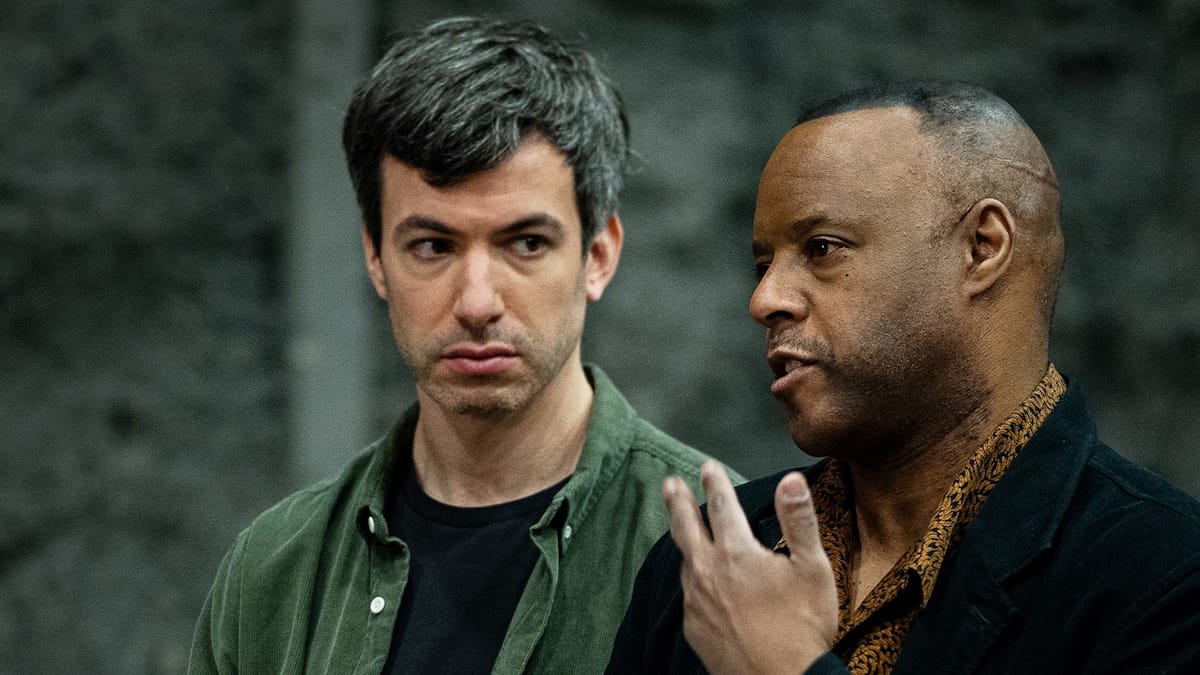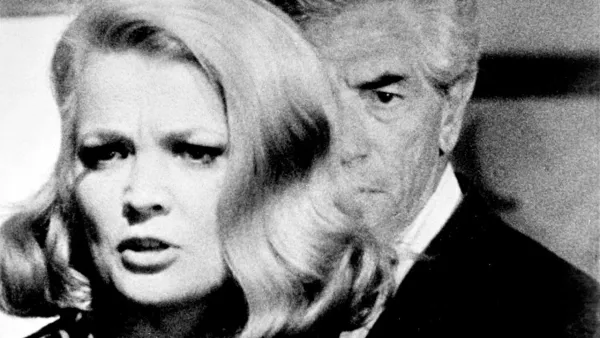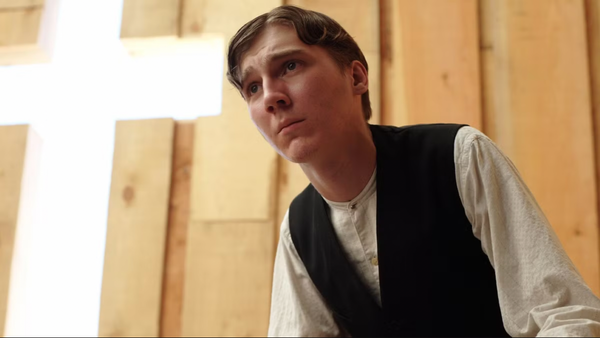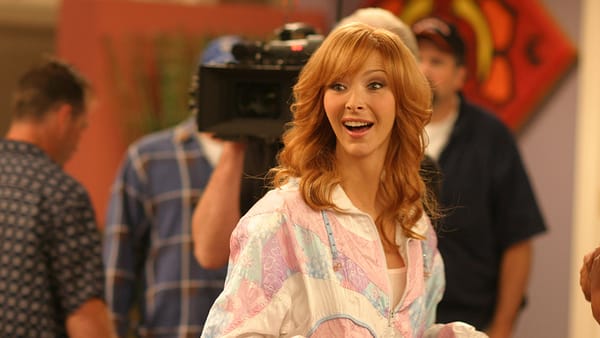Nathan Fielder's Chaotic Good

On Nathan Fielder's show The Rehearsal (photo Allyson Riggs/HBO)
There’s a telling moment about halfway through the pilot of The Rehearsal, Nathan Fielder’s series for HBO Max, in which Kor, the episode’s middle-aged subject, compares Fielder to Willy Wonka. The remark is meant as a compliment, but it catches Fielder off guard. “Isn’t he the bad guy?” he asks. Kor’s observation is precise: The Rehearsal, like Fielder’s previous show, Nathan for You, finds Fielder constructing larger-than-life solutions for everyday problems, blazing past questions of ethics in favour of results the shows’ subjects weren’t sure they wanted in the first place. Kor insists his comment was a kind one, that despite some collateral damage along the way, Willy Wonka still made dreams come true. Fielder isn’t convinced. “But kids died in that factory,” he responds.
It’s never quite clear whether Nathan Fielder is a good guy or a bad guy. The Rehearsal is an exercise in obfuscated borders; it obstructs the lines between host and subject, between scripted and organic content, between those who hold power and those who do not. It’s a comedy show — a deeply funny one — so it feels safe to assume Fielder is playing some heightened version of himself, but his deadpan droll makes it difficult to parse where the character ends and the real Nathan Fielder begins. The show is deeply personal, but we never learn much more about Fielder than that he’s gone through a divorce and that he may or may not want a family. The Rehearsal is as exhilarating and infuriating as a great magic trick: you can’t help but marvel at the heights Fielder will climb for a good bit, but it’s hard to forget you’re being taken for a ride. Also, why is this weirdo so intent on tricking us? Fielder’s laissez-faire approach to objective truth — toward the show’s audience, but especially toward its subjects — can make it difficult to say whether his audacity is worth what he puts people through. Still, a profound humanity runs through The Rehearsal, one that lends the show a kindness absent from the network reality TV it lampoons. Fielder seems to thrive in the morally ambiguous space between good intentions and ethical behaviour.
Fielder met Kor through Craigslist. The Rehearsal showrunner posted a nondescript ad for a “TV opportunity” with a prompt to submit a video describing “something you’ve been avoiding.” In a self-taped clip, Kor explains that he’s been sitting on a lie: years ago, he’d told his trivia team that he held a master’s degree, when in fact he only has a bachelor’s. The lie is innocuous enough, but having to tell it every day has been eating at Kor, and he’s struggling to fess up — particularly to Tricia, a blogger and trivia teammate he fears wouldn’t be able to forgive him if she found out. The Rehearsal begins when Fielder visits Kor’s apartment to propose a solution, one that doubles as the series’ conceit: Kor and Fielder will work together to rehearse Kor’s confession to Tricia, played out over a night of bar trivia, as many times as it takes to cover every possible outcome. The idea is that the confrontation will be less intimidating if they can plan for whatever might happen — in Fielder’s words, that “maybe it’s easiest to choose a path when you can live the future first.”
It's the kind of seductively optimistic and utopian premise that seems too good to be true, and Fielder soon proves its shortcomings with a confession of his own. Weeks before his meeting with Kor, Fielder had sent crew members posing as workers from a gas company to photograph then create a digital map of Kor’s apartment, which Fielder used to build an exact replica of the space in a nearby warehouse. He then hired an actor to play Kor in a rehearsal of their meeting, a meticulous exercise during which Fielder practiced everything from icebreakers to the show’s pitch, to all of Kor’s possible reactions. Fielder’s reveal is the first in a seemingly endless series of twists, and it serves as a reliable synecdoche of the sort of audacious and invasive deception that both fuels The Rehearsal and posits the series as a discourse powder keg. Each of The Rehearsal’s four episodes that have aired as of this writing have induced tidal waves of posts, tweets and think pieces as quick to label Fielder a sociopath as they are to laud the show’s ingenuity. Yet there is a common consensus that the show crosses an ethical boundary; that, as showrunner, Fielder wields power disproportionate to the show’s subjects, that Fielder’s trademark discomfort and propensity to bend the truth is more manipulative than it is funny. The Rehearsal’s premise is as morally thorny as the juiciest of pop-psych hypotheticals, and it’s no wonder why anyone might have a hard time putting a finger on its morality.
The most prominent of Nathan Fielder’s detractors might be Richard Brody, who describes Fielder in The New Yorker as “arrogant, cruel, and, above all, indifferent.” As Fielder and Kor rehearse the latter’s confession — naturally, in an exact replica of the real trivia bar that Fielder has had built in a warehouse — the show racks up a good score of ethical liberties, many of which critics like Brody deign harmful to the show’s subjects. Among them: an actor hired to play Tricia lies about her job to score an interview with (and study) the real Tricia; Fielder poses as a blogger to filch the answers from the real trivia night’s host after it becomes clear that Kor might prioritise the game over the confession; Fielder instructs Kor to lie about his grandmother’s death to secure the proper table for his real night out with Tricia. Fielder widens the gap between himself and his subjects with every removal, and while it’s fascinating to watch the boundaries between reality and construction bleed into each other, it’s hard to ignore the increasing imbalance of agency. It’s also rare that we get a sense of how the subjects of The Rehearsal actually feel about being put through Fielder’s schemes — after Fielder admits he’s rehearsed their first interaction, the most we get from Kor is a subdued “Wow” — and Brody suggests the distance between Fielder and his subjects is a marker of a solipsistic breach of power.
Brody and similar critics are right to feel protective of Fielder’s subjects. Nathan Fielder is, after all, a comedian, and The Rehearsal’s brand of docufiction necessitates a lopsided power balance that allows Fielder to pull strings from behind the curtain. Since the show ended in 2017, many of Nathan for You’s subjects have reported decidedly mixed feelings about their involvement in Fielder’s experiments, with at least one participant stating she wouldn’t have signed on had she known it was a comedy show. That someone might appear on television under false pretences is ethically dubious, and casting these real people as collateral for the show, as Augustus Gloops and Veruca Salts drafted in service of the factory, is irresponsible at best. But to paint The Rehearsal’s subjects as the butt of a joke is to misread the heart of the series and to willfully disregard the empathy that Fielder embeds into his lunacy. None of the dozens of punchlines in The Rehearsal’s pilot are cheap, nor do they find targets in the episode’s subjects. That’s not to say Fielder shies away from discomfort: Kor and Tricia, the most prominent nonactors in the pilot, are far from media trained, and a character in a subsequent episode juxtaposes evangelical zeal with a fuckboy’s raison d'être so tenaciously that it is impossible not to laugh. The locus of The Rehearsal’s satire, though, falls on its own construction.
Fielder’s methodology, whether it’s applied toward confessing a lie, preparing for a family, or confronting a loved one, is defined by a Rube-Goldberg complexity, one that highlights the futility of approaching difficult human interactions with tools like decision intelligence and structures like reality TV. The effort Fielder puts into recreating Kor’s apartment and rehearsing their interactions with an actor burns up in an instant when Fielder botches a joke about clogging the real Kor’s toilet. Fielder and Kor run the rehearsal of Kor’s confession hundreds of times, preparing for variances as minute as an empty drink on the table, but none of the practice rounds account for how nervous Kor becomes when it’s time for the real thing. Fielder is nothing if not a great editor, and the show’s cuts are consistent in finding their targets in process over people. But The Rehearsal’s empathy is more deliberate than a byproduct of spared punchlines. As Fielder’s constructions rocket toward implosion, he’s careful to remember the humanity of the people he’s involving along the way. While researching Tricia through her NYC thrift blog, “Cheap Chick in the City,” Fielder notes that many of the posts are simple apologies for not having anything to report. There are easy jokes to be made here, but Fielder takes another route: “Sometimes you don’t want to say anything, but you do want people to know you exist,” he narrates. It might read as a disposable platitude in a more saccharine program; that Fielder deadpans the line while studying how to best replicate Tricia’s character renders it grotesquely kind.
If Fielder allows the show to find punchlines in anyone, it’s himself. He opens the pilot by admitting, “I’m not good at meeting people for the first time,” and The Rehearsal goes out of its way to both prove and rail against Fielder’s self-imposed boundaries. For a TV host, Fielder is decidedly reserved, almost demure, suggestive of someone who’d rather be behind the camera than in front of it. But Nathan Fielder is as much, perhaps more so, The Rehearsal’s main character as are any of its subjects, and as the show’s creator, writer, and director, it’s impossible to pin Fielder’s heavy screen time as anything but explicitly intentional.
Fielder’s quietly unmistakable insertion of himself in the show — not wanting to say anything but wanting to be seen — is a paradox that drives The Rehearsal beyond a series of quirky social experiments and into uniquely vulnerable territory. Toward the end of the pilot, it’s clear that the show’s go-for-broke bits, from fake bars and apartments to matryoshka-level metafictional characters, are as much for Fielder’s sake as they are to help the people who sign up to be on TV. Which leaves Fielder as exposed to the show’s methodology as its subjects: as he works to feed Kor the answers to the trivia night in a series of conspicuous, Slumdog Millionaire–flavoured micro-scenes (arguably the episode’s funniest moments), Fielder is forced to reckon aloud with the show’s moral murkiness. Admitting that it would be unethical to make Kor cheat at a game he very much cherishes, Fielder wonders if “maybe it’s more unethical to leave things to chance when there’s something you could have done.” The show never offers a clear answer to that question. But Fielder’s own involvement in, and reliance on, The Rehearsal’s constructions create a space for kindness that makes the show an artefact of humanity as much as it is a series of outrageous stunts and trainwrecks.
After countless rehearsals, pep talks and false starts, between breaks in trivia and over cheese pizza and orange juice with no pulp, Kor finally confesses to Tricia: “My whole educational life has been kind of a fraud,” he says. Tricia, despite what we’ve heard about her, takes it well — but of course she does. Kor’s lie is neither malicious nor manipulative; it’s the kind of impulsive fib that tells itself and backs you into a corner, and the lengths Kor takes to make things right and preserve their relationship speak far louder than a petty lie about higher education. Kor and Tricia go on to talk for an hour and a half, revealing truths they’d never known about each other over a decades-long friendship, as all of Fielder’s stunts fade into the background. This might be The Rehearsal’s best joke: that even the most elaborate constructions we use to establish and circumvent each other’s boundaries are no match for uncomplicated, human interaction. Whether Nathan Fielder is a good or a bad guy remains to be seen; that he’s a dream-maker is already proven.



